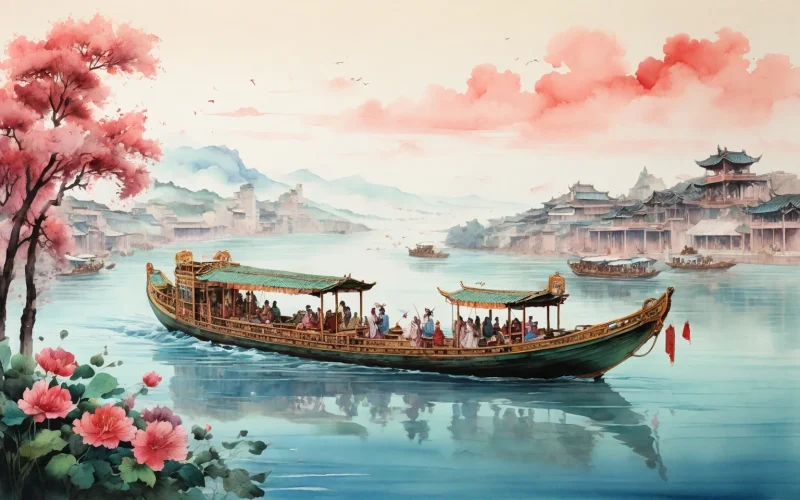In a ship of spice-wood with unsinkable oars,
Musicians at both ends, we drift along the shores.
We have sweet wine with singing girls to drink our fill,
And so the waves may carry us wherever they will.
Immortals could not fly without their yellow crane;
Unselfish men might follow white gulls to the main.
The verse of Qu Yuan shines as bright as sun and moon,
While palaces of Chu vanish like dreams at noon.
Seeing my pen in verve, even mountains shake;
Hearing my laughter proud, the seaside hermits wake.
If worldly fame and wealth were things to last forever,
Then northwestward would turn the eastward flowing river.
Original Poem:
「江上吟」
李白
木兰之枻沙棠舟,玉箫金管坐两头。
美酒樽中置千斛,载妓随波任去留。
仙人有待乘黄鹤,海客无心随白鸥。
屈平辞赋悬日月,楚王台榭空山丘。
兴酣落笔摇五岳,诗成笑傲凌沧洲。
功名富贵若长在,汉水亦应西北流。
Interpretation:
This poem was composed by Li Bai during his travels in Jiangxia (modern-day Wuchang, Wuhan, Hubei). There are two different claims regarding the exact time of its creation—one placing it in the 22nd year of Emperor Xuanzong’s Kaiyuan era (734) and the other in the 2nd year of Emperor Suzong’s Qianyuan era (759). At the time, the poet was discontented with the constrained realities of the world, and thus, through the grand act of reveling on the river, he expressed his disdain for worldly fame and his longing for a life of freedom.
First Couplet: “木兰之枻沙棠舟,玉箫金管坐两头。”
A boat with oars made of magnolia wood and a hull crafted from fine sand pear wood, with musicians playing jade flutes and golden pipes seated at both ends.
The poet employs luxurious imagery to depict a splendid and ethereal river journey, creating an atmosphere that transcends the mundane world and setting the tone for the entire poem.
Second Couplet: “美酒樽中置千斛,载妓随波任去留。”
The wine jars are filled with a thousand measures of fine liquor, while singing courtesans drift freely with the waves, unconcerned with where they may go.
Through deliberate exaggeration, this couplet illustrates a life of indulgence and carefree pleasure, reflecting the poet’s disdain for worldly affairs and his yearning for an unrestrained existence.
Third Couplet: “仙人有待乘黄鹤,海客无心随白鸥。”
Even immortals must wait for a yellow crane to ascend, whereas the sea wanderer, free of attachments, follows the white gulls at ease.
By contrasting the “immortal” and the “sea wanderer,” the poet conveys his detachment from worldly ambition, suggesting that a spontaneous and carefree life is far more liberated than the pursuit of transcendence.
Fourth Couplet: “屈平辞赋悬日月,楚王台榭空山丘。”
Qu Yuan’s poetic works shine as brightly as the sun and moon, while the grand palaces of King Chu have long turned into desolate hills.
By juxtaposing Qu Yuan and the King of Chu, the poet emphasizes that talent and virtue endure through time, whereas luxury and power ultimately fade into oblivion, reinforcing the poem’s core message.
Fifth Couplet: “兴酣落笔摇五岳,诗成笑傲凌沧洲。”
When inspiration flows, the strokes of the brush seem to shake the Five Great Mountains; once the poem is complete, the poet laughs in triumph over the vast waters.
This couplet showcases the poet’s unrestrained spirit and extraordinary talent, highlighting his contempt for the powerful and his lofty aspirations.
Sixth Couplet: “功名富贵若长在,汉水亦应西北流。”
If wealth and fame could truly last forever, then the Han River should flow backward to the northwest.
By using an ironic reversal, the poet mocks the obsession with status and riches, emphasizing the impermanence of worldly success and reinforcing his tone of scornful detachment.
Writing Features:
- Exuberant and grand in style: The poet employs extreme exaggeration to depict the lavish river revelry, creating a striking visual impact.
- Sharp contrasts with profound meaning: The comparison between Qu Yuan and King Chu highlights the lasting influence of talent versus the fleeting nature of power, strengthening the poem’s theme.
- Well-structured with progressive depth: The first four couplets depict river festivities, the middle ones delve into philosophical reflections, and the final ones conclude with an air of heroic defiance, forming a clear progression.
- Elegant diction with a rhythmic cadence: The poem is filled with magnificent imagery such as “jade flute and golden pipe” and “riding the yellow crane,” enhancing its artistic appeal.
Overall Appreciation:
In this poem, Li Bai begins with a vivid portrayal of a river journey, expressing his transcendence beyond worldly concerns and pursuit of personal freedom. The first half presents a luxurious, carefree revelry, subtly hinting at the poet’s detachment from reality. The middle section, through contrasts between immortals, wanderers, Qu Yuan, and King Chu, unveils the transient nature of fame and fortune while underscoring the immortality of literature and spirit. The poem culminates in a powerful expression of the poet’s defiance against authority and his uninhibited nature. With the concluding line—“If wealth and fame could truly last forever, then the Han River should flow backward to the northwest”—Li Bai delivers a sharp and memorable satire, reinforcing the poem’s central message. The poem’s passionate emotion, splendid imagery, and unrestrained style exemplify Li Bai’s romanticism and transcendent spirit.
Insights:
Li Bai’s poem conveys his detachment from reality and his pursuit of freedom, while also revealing the fleeting nature of wealth and power. It not only showcases his uninhibited personality but also prompts deep reflection on the true value of life. Power and riches, like passing clouds, are impermanent, whereas true legacy lies in one’s spirit and talent. Through his carefree stance, the poet urges us not to be consumed by ambition but to seek the true essence of life and inner freedom.
Poem translator:
Xu Yuan-chong(许渊冲)
About the poet

Li Bai (李白), 701 - 762 A.D., whose ancestral home was in Gansu, was preceded by Li Guang, a general of the Han Dynasty. Tang poetry is one of the brightest constellations in the history of Chinese literature, and one of the brightest stars is Li Bai.











